- Home
- Anne McCaffrey
An Exchange of Gifts Page 2
An Exchange of Gifts Read online
Page 2
“Indeed?”
There were moments when this lad sounded ancient, but he’d doubtless had a hard life and was old before his time.
“Yes, indeed, for I am very good at making plants grow and thrive and in preparing potions, linctuses, poultices, salves, and tisanes. So long as I was reading quietly in a corner,” she said in a bitter tone, “they really didn’t bother with what I was reading. You see, I have the Green Thumb and the Curing Hand.”
He looked at the hand with which she held her egg slate and then at the other resting on the table.
“They don’t look any different to mine.”
“Ah, they don’t have to look green,” she said regarding both hands critically, “but in them lies my Gift, and they make green and abundant anything I choose to grow and potent anything I choose to prepare. So, I’ll make ready the garden…”
“D’you know how, La…Meanne?” Wisp plainly had doubts on that score.
“Chimneys may defeat me, but gardens do not,” she said firmly and got to her feet. “I have theory as well as practice.” She didn’t say that three window boxes in her own solar was the extent of her practice, but she knew her Gift would suffice.
“Then I shall assist…”
“Not with that sore back, you don’t…”
Wisp shrugged. “I’m not so poor I cannot help a lady.”
“How often must I tell you that I’m not a lady here?”
“As you wish. I grant you it’s not much of a place but, while you start your garden, I shall do what I can to clean and set snares for woodcocks and rabbits. I saw their tracks.”
“Is that your Gift?”
“My Gift?” and Wisp looked startled and then gave a little laugh. “No, that is not my Gift, though a useful one it would be. Not everyone has a Gift, you know,” he added in a melancholy tone.
“Sadly that is true,” she said, “but you have a sweet smile and a helpful disposition and those are sometimes more than many Gifted people have.”
He swept her a passable and charming bow. He must have lived in a courtly house to have learned such a gesture, Meanne thought as she went to the window ledge to collect the seedlings.
Despite the tangles of weeds in the old garden, recent rains made the earth loose enough to pull them out easily. On her hands and knees, she prepared the ground, sifting through the moist dirt with her fingers to remove any stones that might have grown up in the patch since it had last been worked. She found so few she wondered if the old charcoal maker had a minor Gift of Growing himself.
She found some few sprouts and, touching them gently, learned what they were and what they would become. Well, all vegetables would be welcome, too. She placed them to one side, neatly heeling them in. She’d do a kitchen garden as well, but the herbs would be her support and the comfort of others.
She sang softly under her breath as she worked, delighted not to be disciplined for that harmless habit.
So she worked cheerfully, planning for her future in this place. Sounds of great industry from the hut came to her so that, when she had finished this initial start, she hoped that her companion had finished his.
He had. With results that astonished her. The place was immaculate: the top of the rickety old table had been scrubbed clean and level, and the two stools placed beneath it were also clean as well as mended. The fire was cheerful, and the pot over it emitted an enticing aroma. On the table there were two bowls, cracked but clean, alongside her silver spoon and the old wooden one. The two little windows gleamed; there wasn’t a cobweb to be seen, and when she peeked into her sleeping alcove, that too had been brought to order, her cloak spread over the evergreen boughs, which also had been plumped up.
“Oh, my word, Wisp, but you’ve done wonders in a short time,” she said, clasping her hands together, aware that she was just a breath short of tears which she abhorred in others and certainly in herself.
“I do my best…Meanne.” He was still having trouble with speaking her name right out.
“Say it—Meanne, Meanne, Meanne!”
He did and without hesitation, smiling at the conclusion.
“And what have you contrived to put in the pot?”
“A bit of this’n’that,” he said proudly. “We’ll do better when the snares work.” He lifted the lid of the pot with a forked stick and gave the contents a stir with another stick. “Hmmm. It’s done.”
They ate, with hunger the best sauce, and enjoyed the fish stew, for Wisp had managed to catch some of the speckled trout from a pool of the stream which he had discovered on his way here. She hadn’t even heard him come and go, but then, she had been concentrating on her seedlings and that somewhat stopped other senses.
“I shall find some witch’s yeast for you,” Wisp said, “and…oh?” he turned wide eyes to her. “Can you make bread?”
“Ah, not really,” she said sadly. “Can you?”
“Indeed I can.”
“But we’ve no flour.”
“There’s a village…” and he flicked his hand in its direction, “not far…”
“I’ve very few coins…” Another matter which had long irked her. She had had only to ask for ‘things’ and, if it was felt they were good for her, they were provided. But coins to jingle were not among such ‘things.’ Those in her possession had come to her as favors in holiday cakes: one was gold.
“The miller’s kind to orphans.” Wisp winked at her.
“How do you know that? Are you from around here?” She had a sudden pang of fear that Wisp might inadvertently lead any searchers in her direction.
“No, not from around here. Should I be so foolish as to remain where hands are turned against me?” His tone surprised Meanne, for it sounded so…so old and fierce. “Have no fear that I shall lead ‘friends’ to you, Meanne,” he added. “I’ve no more wish to be ‘found’ than you do.”
“How do you know I don’t wish to be found?”
Wisp gave a snort and gestured about the humble room with one begrimed hand. “You’ve come to this in desperation, have you not?”
“Not quite in desperation,” she said a bit tartly, “but to have the freedom to live the life I choose to live, not what others have in mind for me.”
“One and the same, Meanne,” and now his engaging smile warmed his face and eyes.
“Not really,” she began, all set to argue with Wisp, too, but he cocked his head at her. “So, you acquire yeast and flour…I’ve the honey…”
“I know where more bees swarm…”
“And I can find edible roots, plants and berries. I’ve seasonings, too. There’s more to good cooking than knowing how to put the ingredients together.”
“There is indeed,” he agreed generously. “Ah, do you have any small coins?” he asked and, scrubbing his palm on his pant leg, held out his hand.
“I do,” she said, and turning her back on him, removed the slim little purse from its place of safe-keeping. She upended it on the table and they both looked at the meager wealth.
Wisp touched the gold piece. “That would have to be held back. It wouldn’t do for us to have such.”
“That was my charm from a Noel cake,” she said, which was certainly true.
“And your parents allowed you to keep it?” He seemed amazed at that.
“The slice had been given me and so I was allowed to keep it.” She’d had a battle to do so then, and so the gold piece was particularly a treasure. “Won’t these do?” She pointed to the silver and copper coins.
“They’ll do just grand,” he said and, looking up at her for permission, took two of the copper ones. “This’ll buy us flour and I’ll see can I get a measure more for my poor ol’ mum in the forest.”
“Your poor ol’ mum?” Meanne didn’t know if she was insulted or delighted by his scheme. His cocky grin challenged her so she lau
ghed. “I’ll ‘ol’ mum’ you, my bhoy!” she said, imitating her old nurse.
“You do that well,” Wisp said. “Be sure to use just that tone if any one comes by while I’m gone.”
“You don’t think anyone will, do you?” she asked anxiously.
“I doubt it,” Wisp said, taking up his empty pack to carry the flour. “But you’d want to think ahead to what could happen, and then you’re prepared for it and can fall into it whenever necessary.”
That sounded eminently sensible to Meanne, and she thought that Wisp was clever indeed to be so beforehand.
“Now,” and she assumed old Martita’s strained tones, “you be a good lad and be back right smart for your chores. I’ll not have you wasting time with the village lads when I’m not there to keep an eye on you.”
“Oh, now, mum, you know I never linger,” he said in a properly contrite tone while his eyes danced with merriment.
“On your way, you scamp,” she said, still Martita. “The journey begun is sooner ended. Scat!”
He left and immediately poked his head back around the corner of the door. “What’ll you be doing while I’m gone?”
“Washing my dress, of course,” she said.
“Then be careful where you hang it to dry, mother dear.” With that he departed again.
She took that caution to heart. Her dress, or rather one of the two garments she had filched from the closet containing servant liveries, was not the sort ordinarily associated with an “elderly woodsy mum.”
Washing her own clothing was also not something with which she had had much practice, but she managed, and the soot came out of the sturdy fabric after three hard scrubbings and rinsings. Her knuckles were raw and she had reduced her one cake of soap to a sliver. She ought to have planned more carefully. Still, she was free to make more. That had been one of the practical recipes she had brought with her, tucked into her herbal book.
After hanging her dress to dry, she made sure that Silverheels was all right and then walked deeper into the woods. There’d be squirrel burrows with whatever was left of winter nuts in them. If she only took a handful from each supply, she would not cause hardship. She found mushrooms as well, the big capped ones, and filled her skirt on her way back to the hut. And she plucked a handful of bluebells and cowslips. Flowers did so brighten a place.
CHAPTER 3
That evening Wisp taught her how to make bread, for he’d been given a start of yeast by the miller’s wife. He’d found duck eggs on his way back and collected two woodcocks from his snares. So they feasted.
“They’ve a market fair every month, the first Saturday,” Wisp told her as he picked clean the bones of his bird. “When you’ve herbs and all to be sold, that’d be a good place to go.”
“I think not,” Meanne said.
“Oh? Well, I can come and go. No one pays much attention to a scamp like me,” Wisp said, his charming grin in place. “But youil want to, sooner or later.”
“No, I won’t. I’m safe here.”
“You’ll be safe with me at the market, too.”
“I may be able to sound like an old crone from the safety of this hut,” she said spiritedly, “but I know I don’t look like one. Yet.”
“That you do not, Lady Meanne, but with a little coaching from me,” and his grin was malicious, “I can school you to assume the character that’s needed. A little dirt on your face, some soot in your hair…” and he hastily added, “though it’s a shame to do so… You’ll be safe enough…me ol’ mum!”
“I doubt I’ll feel the need for company.”
“Thank you, Meanne,” he said.
“I didn’t mean to compliment you, you young scamp.”
“But you did!” He waggled a finger at her, very pleased with himself.
“And tomorrow we’ll have no scivving off to the village to gossip and…”
“Gossip I didn’t, Meanne, but I did get us a bit of butter for our bread.”
“Oh, you didn’t!” Meanne felt her mouth salivating for bread and butter even though her stomach was remarkably full. She’d forgot how she missed such commonplaces. “Now, about tomorrow,” she said, bringing herself back to the practical aspects, “how’s your back? Could you help me transplant some bushes? I’ve found some that need more sun than they’re getting.”
“I’m yours to command,” he said, again with that gracious courtly gesture.
“Were you a page?” she asked, curious.
He waggled a finger at her. “We are Meanne and Wisp, and our pasts are our own. I’ve asked you no questions. You ask none of me.”
“Well, if that’s the way you want it…” She could understand how he wouldn’t like to dwell on a life that had caused him to receive such a beating. And she certainly didn’t want to talk about why she had been obliged to leave her home. “We were reborn when we changed to what we now are, Wisp and Meanne, the moment we came through that door.”
“Aye, that’s true enough,” Wisp said in a ringing voice.
* * * *
Because growing was her Gift, the garden flourished. The seeds sprouted, the seedlings grew, and all the bushes and plants she found on her wanderings through the forest, which Wisp willingly transplanted around the hut for her, took happy root and thrived. She taught Wisp how to pound the willow for its therapeutic powder. She made salves for healing, salves for fragrance, dried camomile and valerian and other roots and leaves for teas, and gathered still other plants and flowers for the dyes they would produce. She made little bags out of the muslin she had brought with her and stitched them finely in the one feminine accomplishment she had not resisted learning. Whenever she had enough to fill a basket—Wisp wove several for her from river reeds—she sent him to the market to sell the wares.
She found that she awaited his return more and more eagerly, for the news he would bring, and the stories he recited of how he had sold this to the mayor’s wife and that to the innkeeper’s, and how pleased they were with them.
“I made you not so old, Meanne, because I’m not, but m’father was killed in the war,” he said, drawing a long face, “and we were turfed out of our tied cottage and set upon the road…”
Meanne drew in her breath. “Surely bailiffs don’t do that to people…”
“Where have you been living all your life?” was his quick response. “Never mind. But it happens and we’re lucky it does. I suspect the forester will be by to check on us. He was at the market today and it’s not wise to lie to him for he could also turf us out. He’s worried about his deer. But he’s nothing to fear for them in us. Not from Wisp.” And suddenly Wisp seemed smaller and more frail than ever, though he’d been looking very healthy and strong but a few seconds before. Meanne laughed heartily at his altered mien. “But he’ll be by,” Wisp went on, “so remember to use your nurse’s voice if you hear a man’s nearby.”
“Yours is manly,” she said, for Wisp’s voice had already changed to an adult tenor before his arrival at the hut.
“You are too kind,” he replied, again with a bow. “He speaks with a marked provincial accent. You’ll have no trouble recognizing it.”
“Will I be able to understand him?”
“Well,” and Wisp considered this, “you’re not ancient so your hearing’s all right, but I shouldn’t encourage him, were I you.”
“You’re not, but I won’t,” she said flatly. “I have other things to do than encourage boors,” she added, gesturing so vehemently that Wisp cringed behind upheld hands. “Sorry!” She was instantly contrite, remembering the weals on his back.
It was lucky that Wisp had thought to warn her of an impending official visit, for the Forester came by early the very next morning, while Wisp was out checking his snares. It was the sudden silence of the birds and small forest animals that warned her of his approach. She was already wearing the head scarf she used to
keep hair out of her eyes while working in the garden, so when the bulky Forester loomed at the open door, she had only to adopt a servile attitude and Martita’s accent.
“La, sor but you frightened this poor woman outta her wits comin’ in so sudden like,” she said, coarsening her voice as well.
“You be the Widow Sudge?”
While she inwardly railed at Wisp forgiving them such an absurd surname, she bobbed a curtsey, keeping her head bent. Although her hours in the garden had tanned her skin well past what a lady would allow, Meanne knew her face was pretty enough. A mole or two would have helped just now, or a squint. Even a harelip.
“That I be,” she said and wondered if she was overdoing Martita a bit, the way her words came out. “Trying to keep body an’ soul togither fer me an’ me poor lad. We wuz told no one lived here and we could stay on.” She was definitely lisping but, as it helped her disguise her own voice, she thought no more of it.
“Whoever told you that?”
“Oh, sor, don’t be tellin’ me we has to move on. We be good tenants, sor. See how we keeps the place. You’d never be turnin’ us out.”
He was already poking his head in the alcoves and into the cupboards, picking up the little pile of muslin bags she had ready for herbs.
She and Wisp had hidden their small store of coins under a loose brick in the wall of her sleeping place, though the gold one remained in her bodice.
“Neat it is, I see, Widow, an’ if you’d a coin or two for rent, why I could see my way clear to turn my head from your ock-cue-pay-shun. That is,” and he held up a hand, “’til I can find someone else to make charcoal. You being the widow of a war hero who’d won three medals for valor…” And he gave her a quick look, and as quickly away as if he couldn’t bear looking at her.
“Oh, sor, we’ve so little…”
“That son of yours did a brisk trade at the market yesterday, Widow Sudge.” He cocked his head at her, his eye knowing.
“Oh, we’ve little enough for all of that,” she began, moaning, and not knowing how to forestall him, “and my son keeps it by him…”

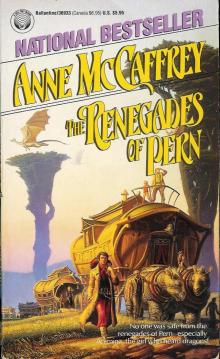 The Renegades of Pern (dragon riders of pern)
The Renegades of Pern (dragon riders of pern)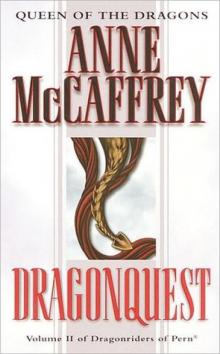 Dragonquest
Dragonquest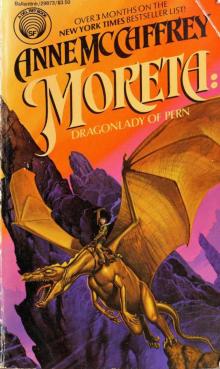 Moreta (Dragonlady of Pern)
Moreta (Dragonlady of Pern)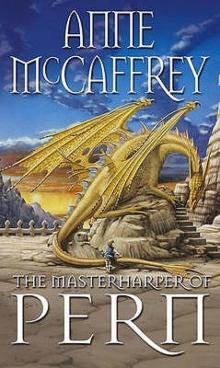 The Masterharper of Pern
The Masterharper of Pern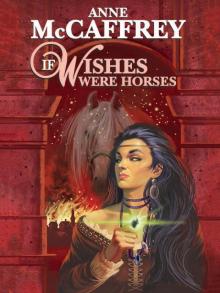 If Wishes Were Horses
If Wishes Were Horses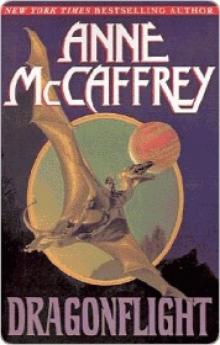 Dragonflight
Dragonflight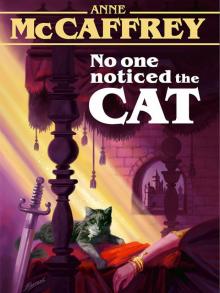 No One Noticed the Cat
No One Noticed the Cat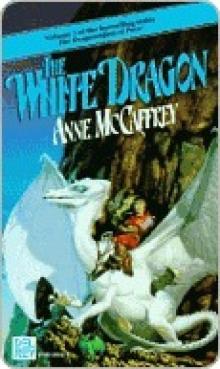 The White Dragon
The White Dragon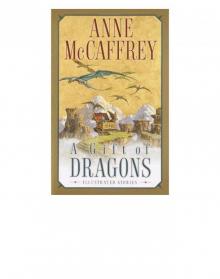 A Gift of Dragons
A Gift of Dragons Harper Hall - Dragonsong
Harper Hall - Dragonsong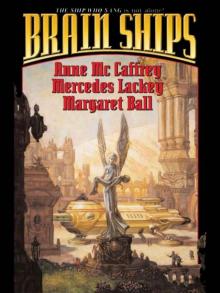 Brain Ships
Brain Ships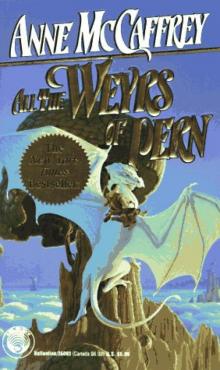 All The Weyrs of Pern
All The Weyrs of Pern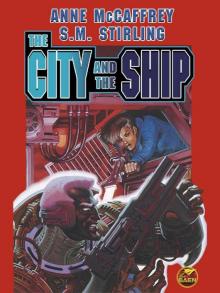 The City and the Ship
The City and the Ship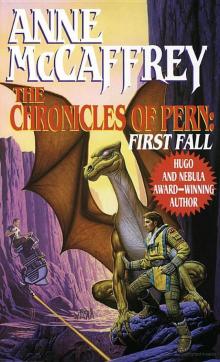 The Chronicles of Pern: First Fall
The Chronicles of Pern: First Fall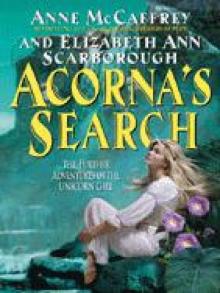 Acorna’s Search
Acorna’s Search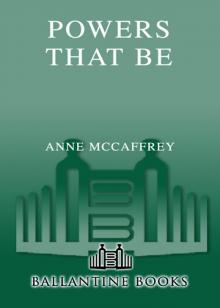 Powers That Be
Powers That Be Second Wave
Second Wave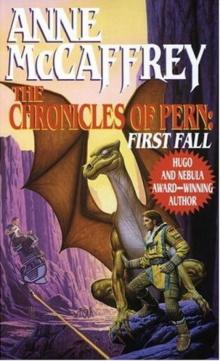 Chronicles of Pern (First Fall)
Chronicles of Pern (First Fall)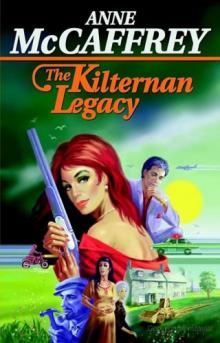 The Kilternan Legacy
The Kilternan Legacy Decision at Doona
Decision at Doona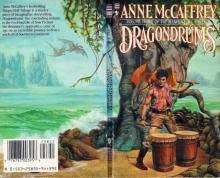 Dragondrums (dragon riders of pern)
Dragondrums (dragon riders of pern)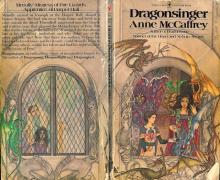 Dragonsinger (dragon riders of pern)
Dragonsinger (dragon riders of pern)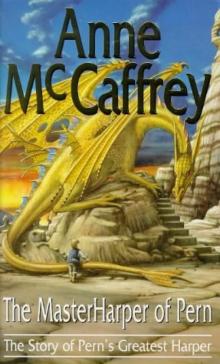 The Master Harper of Pern
The Master Harper of Pern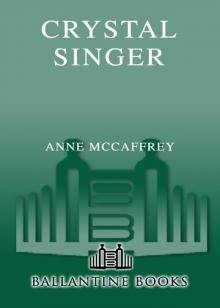 Crystal Singer
Crystal Singer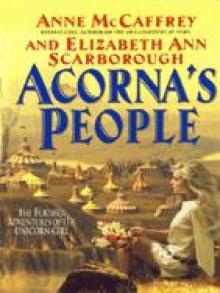 Acorna’s People
Acorna’s People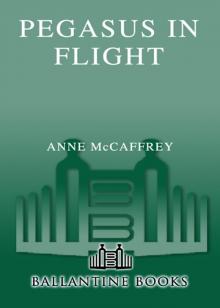 Pegasus in Flight
Pegasus in Flight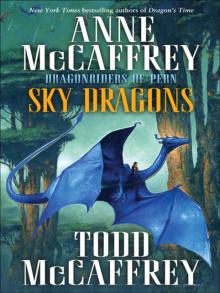 Sky Dragons Dragonriders of Pern
Sky Dragons Dragonriders of Pern Dragonriders of Pern 4 - Dragonsinger
Dragonriders of Pern 4 - Dragonsinger Treaty at Doona
Treaty at Doona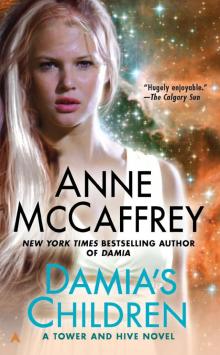 Damia's Children
Damia's Children Stitch In Snow
Stitch In Snow The Rowan
The Rowan Dinosaur Planet
Dinosaur Planet The Year of the Lucy
The Year of the Lucy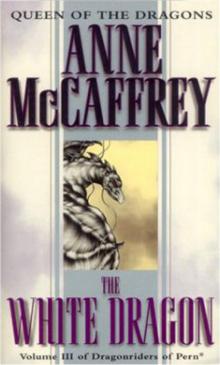 The White Dragon p-4
The White Dragon p-4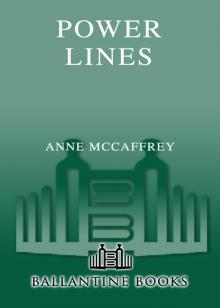 Power Lines
Power Lines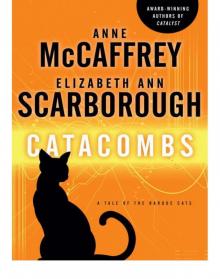 Catacombs
Catacombs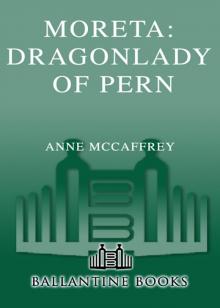 Moreta
Moreta Dragonsinger
Dragonsinger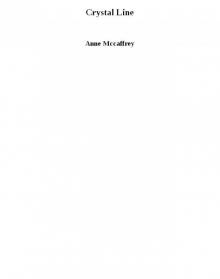 Crystal Line
Crystal Line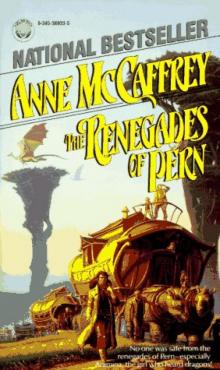 The Renegades of Pern
The Renegades of Pern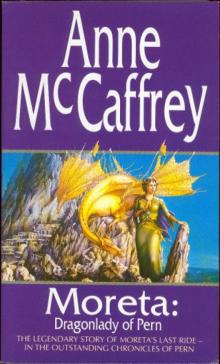 Moreta - Dragonlady of Pern p-8
Moreta - Dragonlady of Pern p-8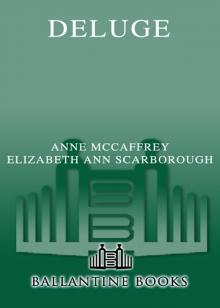 Deluge
Deluge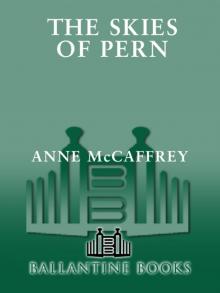 The Skies of Pern
The Skies of Pern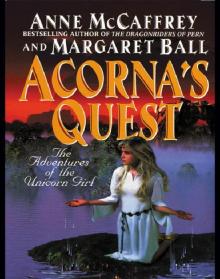 Acorna's Quest
Acorna's Quest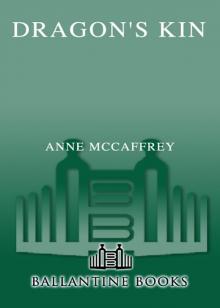 Dragon's Kin
Dragon's Kin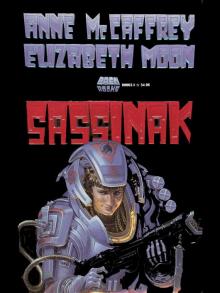 Sassinak
Sassinak![Crystal Universe - [Crystal Singer 03] - Crystal Line Read online](http://i1.bookreadfree.com/i1/03/31/crystal_universe_-_crystal_singer_03_-_crystal_line_preview.jpg) Crystal Universe - [Crystal Singer 03] - Crystal Line
Crystal Universe - [Crystal Singer 03] - Crystal Line Freedom's Landing
Freedom's Landing Acorna’s Quest
Acorna’s Quest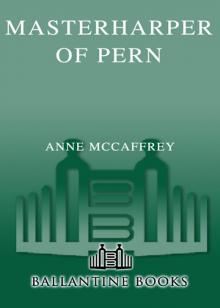 Masterharper of Pern
Masterharper of Pern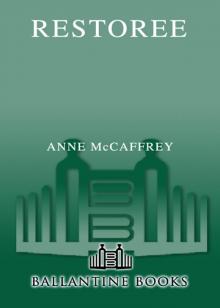 Restoree
Restoree Dolphins of Pern
Dolphins of Pern The Ship Who Saved the Worlds
The Ship Who Saved the Worlds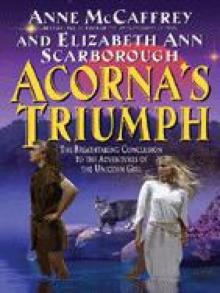 Acorna's Triumph
Acorna's Triumph Acorna's Rebels
Acorna's Rebels![[Acorna 08] - First Warning: Acorna's Children (with Elizabeth Ann Scarborough) Read online](http://i1.bookreadfree.com/i1/04/06/acorna_08_-_first_warning_acornas_children_with_elizabeth_ann_scarborough_preview.jpg) [Acorna 08] - First Warning: Acorna's Children (with Elizabeth Ann Scarborough)
[Acorna 08] - First Warning: Acorna's Children (with Elizabeth Ann Scarborough)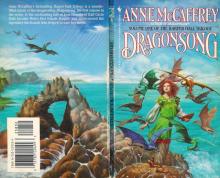 Dragonsong (dragon riders of pern)
Dragonsong (dragon riders of pern) Dragonriders of Pern 6 - Dragondrums
Dragonriders of Pern 6 - Dragondrums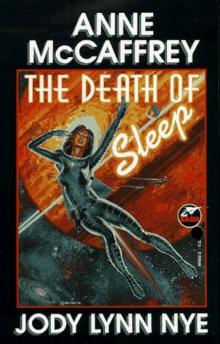 The Death of Sleep
The Death of Sleep Crisis On Doona
Crisis On Doona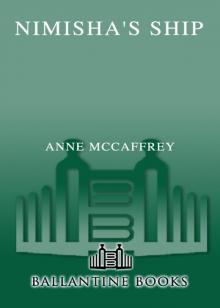 Nimisha's Ship
Nimisha's Ship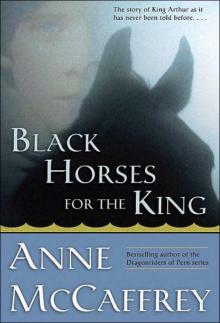 Black Horses for the King
Black Horses for the King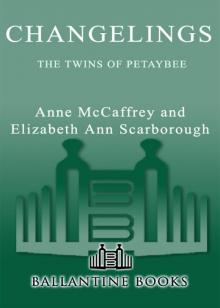 Changelings
Changelings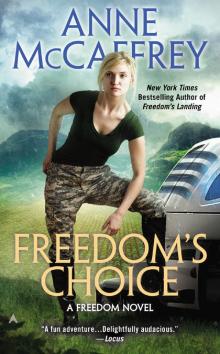 Freedom's Choice
Freedom's Choice The Lady
The Lady The Coelura
The Coelura Catalyst
Catalyst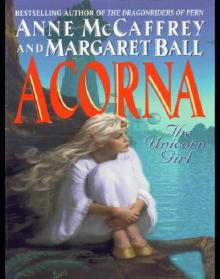 The Unicorn Girl
The Unicorn Girl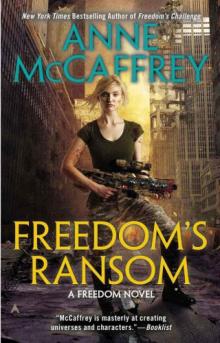 Freedom's Ransom
Freedom's Ransom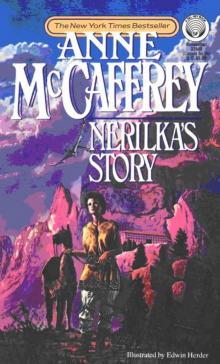 Nerilka's Story
Nerilka's Story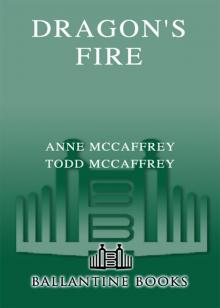 Dragon's Fire
Dragon's Fire Generation Warriors
Generation Warriors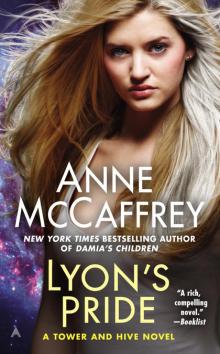 Lyon's Pride
Lyon's Pride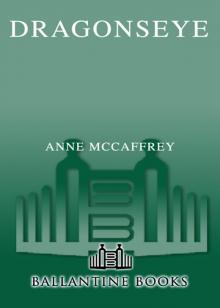 Dragonseye
Dragonseye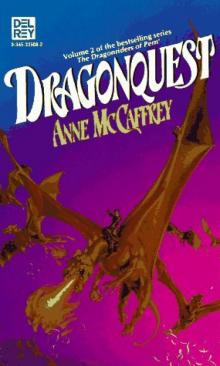 Dragon Quest
Dragon Quest Dragondrums
Dragondrums Dragonsong
Dragonsong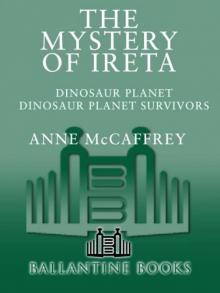 The Mystery of Ireta
The Mystery of Ireta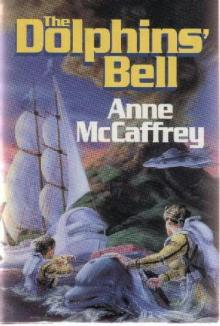 Dolphins' Bell
Dolphins' Bell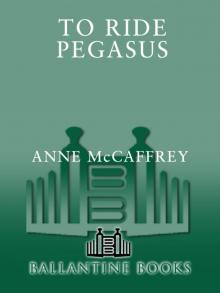 To Ride Pegasus
To Ride Pegasus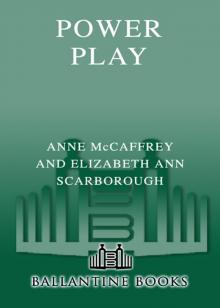 Power Play
Power Play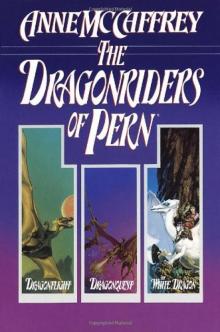 The Dragonriders of Pern
The Dragonriders of Pern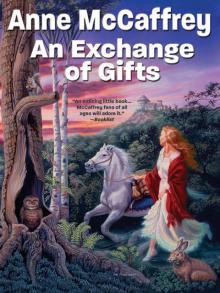 An Exchange of Gifts
An Exchange of Gifts The Ship Who Sang
The Ship Who Sang Sky Dragons: Dragonriders of Pern
Sky Dragons: Dragonriders of Pern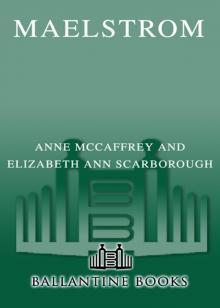 Maelstrom
Maelstrom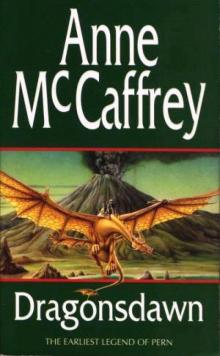 Dragons Dawn
Dragons Dawn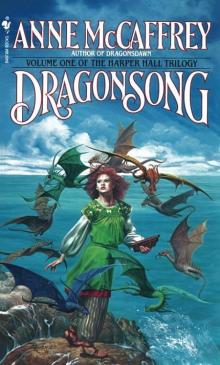 Dragon Song
Dragon Song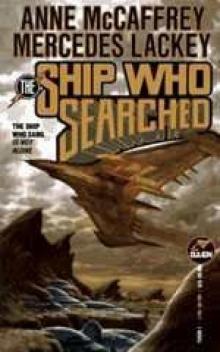 The Ship Who Searched b-3
The Ship Who Searched b-3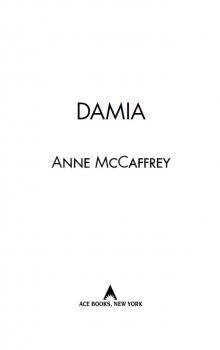 Damia
Damia Freedom's Challenge
Freedom's Challenge